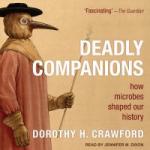April 25, 2019 | sobczakd
Starting April 26 through May 3, it's National Infant Immunization Week! Since 1994, National Infant Immunization Week has focused on the vital role vaccination plays in disease prevention. Vaccines safely protect our children and communities against contagious diseases. According to the CDC (Centers for Disease Control), the number of reported cases of measles has reached its highest number in the United States since the disease was eradicated in 2000. Michigan is one of 22 states experiencing a measles outbreak. Stay informed by consulting with your doctor and for some perspective on the history of viral diseases, here's some resources from our health collection.
Smallpox, yellow fever, malaria, and polio, fearful diseases that once beset Americans, are now largely, just unhappy history. Yet from our confrontations with these past plagues come lessons that inform today's struggles to understand and remedy problems like HIV/AIDS, coronary heart disease, and Ebola infection. American Plagues weaves stories of encounters with epidemics over our history with lessons that aid our present understanding of health and disease. Doctors and clergy, writers and newsmen, public health institutions, and even an entire town relate their personal experiences with various outbreaks and the ways they were identified, contained, and treated. The stories are filled with ambition and accomplishment, jealousy and disappointment, public spirit and self-interest, egotism and modesty. Some episodes lead to vital discoveries. Others were unproductive. Yet each proved instructive and expanded our abilities to gather and process information in ways that improve medicine and public health today. American Plagues gives readers insights into some of the people and events that make up our rich public health history as well as skills to better grasp the complex health information that cascades upon us from the media.
Ever since we started huddling together in communities, the story of human history has been inextricably entwined with the story of microbes. They have evolved and spread amongst us, shaping our culture through infection, disease, and pandemic. At the same time, our changing human culture has itself influenced the evolutionary path of microbes. Dorothy H. Crawford here shows that one cannot be truly understood without the other. Beginning with a dramatic account of the SARS pandemic at the start of the twenty-first century, she takes us back in time to follow the interlinked history of microbes and man, taking an up-to-date look at ancient plagues and epidemics, and identifying key changes in the way humans have lived-such as our move from hunter-gatherer to farmer to city-dweller-which made us vulnerable to microbe attack. Showing how we live our lives today-with increasing crowding and air travel-puts us once again at risk, Crawford asks whether we might ever conquer microbes completely, or whether we need to take a more microbe-centric view of the world. Among the possible answers, one thing becomes clear: that for generations to come, our deadly companions will continue to shape human history.
The story of viruses and humanity is a story of fear and ignorance, of grief and heartbreak, and of great bravery and sacrifice. Michael Oldstone tells all these stories as he illuminates the history of the devastating diseases that have tormented humanity, focusing mostly on the most famous viruses. Oldstone begins with smallpox, polio, and measles. Nearly 300 million people were killed by smallpox in this century alone and the author presents a vivid account of the long campaign to eradicate this lethal killer. Oldstone then describes the fascinating viruses that have captured headlines in more recent years: Ebola, Hantavirus, mad cow disease (a frightening illness made worse by government mishandling and secrecy), and, of course, AIDS. And he tells us of the many scientists watching and waiting even now for the next great plague, monitoring influenza strains to see whether the deadly variant from 1918--a viral strain that killed over 20 million people in 1918-1919--will make a comeback. For this revised edition, Oldstone includes discussions of new viruses like SARS, bird flu, virally caused cancers, chronic wasting disease, and West Nile, and fully updates the original text with new findings on particular viruses.Viruses, Plagues, and History paints a sweeping portrait of humanity's long-standing conflict with our unseen viral enemies. Oldstone's book is a vivid history of a fascinating field, and a highly reliable dispatch from an eminent researcher on the front line of this ongoing campaign.
This stunningly illustrated book provides a rare window into the amazing, varied, and often beautiful world of viruses. Contrary to popular belief, not all viruses are bad for you. In fact, several are beneficial to their hosts, and many are crucial to the health of our planet. Virus offers an unprecedented look at 101 incredible microbes that infect all branches of life on Earth--from humans and other animals to insects, plants, fungi, and bacteria. Featuring hundreds of breathtaking color images throughout, this guide begins with a lively and informative introduction to virology. Here readers can learn about the history of this unique science, how viruses are named, how their genes work, how they copy and package themselves, how they interact with their hosts, how immune systems counteract viruses, and how viruses travel from host to host. The concise entries that follow highlight important or interesting facts about each virus. Learn about the geographic origins of dengue and why old tires and unused pots help the virus to spread. Read about Ebola, Zika, West Nile, Frog virus 3, the Tulip breaking virus, and many others--how they were discovered, what their hosts are, how they are transmitted, whether or not there is a vaccine, and much more. Each entry is easy to read and includes a graphic of the virus, and nearly every entry features a colorized image of the virus as seen through the microscope. Written by a leading authority, this handsomely illustrated guide reveals the unseen wonders of the microbial world. It will give you an entirely new appreciation for viruses.
There's a silent, dangerous war going on out there. On one side are parents, bombarded with stories about the dangers of vaccines, now wary of immunizing their sons and daughters. On the other side are doctors, scared to send kids out of their offices vulnerable to illnesses like whooping cough and measles--the diseases of their grandparents. How did anyone come to view vaccines with horror? The answer is rooted in one of the most powerful citizen activist movements in our nation's history. In Deadly Choices, infectious disease expert Paul Offit relates the shocking story of anti-vaccine America--its origins, leaders, influences, and impact. Offering strategies to keep us from returning to an era when children routinely died from infections,Deadly Choices is a vigorous and definitive rebuttal of the powerful anti-vaccine movement.
Upon becoming a new mother, Eula Biss addresses a chronic condition of fear-fear of the government, the medical establishment, and what is in your child's air, food, mattress, medicine, and vaccines. She finds that you cannot immunize your child, or yourself, from the world.In this bold, fascinating book, Biss investigates the metaphors and myths surrounding our conception of immunity and its implications for the individual and the social body. As she hears more and more fears about vaccines, Biss researches what they mean for her own child, her immediate community, America, and the world, both historically and in the present moment. She extends a conversation with other mothers to meditations on Voltaire's Candide, Bram Stoker's Dracula, Rachel Carson's Silent Spring, Susan Sontag's AIDS and Its Metaphors, and beyond. On Immunity is a moving account of how we are all interconnected-our bodies and our fates.






